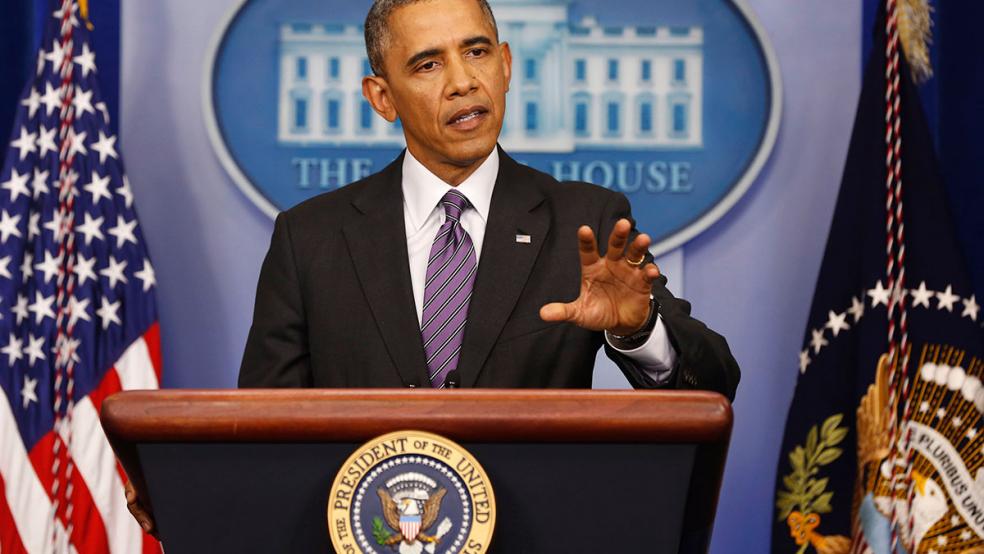President Obama on Wednesday will use his commencement address at West Point to explain and defend U.S. foreign policy in the aftermath of the wars in Iraq and Afghanistan and outline his vision for the remainder of his presidency – and the speech couldn’t come at a better time.
Obama won reelection in 2012 partly because of voter perception that he was better equipped to handle national security and diplomacy than his GOP challenger, Mitt Romney, and the Republicans. But a new poll conducted by Zogby Analytics released this week shows that when it comes to foreign policy and national security, the president and his party have lost ground.
Related: Has the “Obama Doctrine” Failed the Country?
John Zogby introduced the results of the poll yesterday in Forbes, which showed that Republicans are now considered to be superior to the Democrats in handling both national security (by 36 percent to 25 percent) and foreign affairs/diplomacy (by 33 percent to 29 percent). The remainder of those interviewed said that neither party performed well or they weren’t sure.
The Zogby analysis warned that the poll finding could be highly problematic for the Democrats in trying to hang on to a majority in the Senate and limit GOP gains in the House if foreign policy and security issues heavily influence the outcome of the November mid-term election. That’s because the Democrats will not be able to count on several key demographic groups to help them blunt the surging Republicans.
For example, on national security, women now favor the Republicans over the Democrats by a slight 4 percent margin - 30 percent to 26 percent, as do young voters, by a margin of 31 percent to 24 percent. Independents are even more ardent in their support of the GOP over the Democrats on foreign policy and national security – 30 percent to 12 percent. While women give the Democrats a slight edge over the Republicans on foreign affairs/diplomacy – 30 percent to 27 percent – that cannot offset the Democrats’ ten point deficit (38 percent to 28 percent) among men.
Obama will announce this afternoon his plan to withdraw all remaining American combat troops from Afghanistan by the end of 2016, The New York Times reported today, quoting government officials. Under the plan, the U.S. will leave 9,800 troops in Afghanistan through the end of 2014 and then cut that number roughly in half in 2015. By the end of 2016 – as Obama’s second term draws to a close – the United States would have only a normal embassy presence and small security assistance force in Afghanistan, similar to the residual presence in Iraq.
The Times reported that all of these deployments hinge on the United States signing a security agreement with Afghanistan. Obama’s drawdown plan, if successful, would mark the end to more than a decade of American engagement in Afghanistan following the Sept. 11, 2001 terrorist attacks on the U.S.
Related: Europe Takes Dangerous Turn to the Far Right
The speech is the first in a series that Obama and top advisers will use to explain the president’s foreign policy and national security principles and goals for the remainder of Obama’s presidency. Currently, only 43 percent of Americans approve of Obama’s overall job performance while 52 percent disapprove, according to Gallup.
Those activities will include another weeklong trip to Europe culminating in his attendance at a 70th anniversary D-Day commemoration in Normandy. During the trip, the president will travel to Poland for a speech in Warsaw focused on America’s commitment to Europe, in a follow-up to a speech he delivered in Brussels in March.
Obama’s defense of his own doctrine comes at a time when the effectiveness of U.S. actions is in question, David Francis of The Fiscal Times wrote recently. “Around the world, the United States is perceived as failing to influence events in ways it once did,” Francis concluded.
For instance, it is not yet clear whether Obama’s strategy to check Russian President Vladimir Putin’s ambitions in Ukraine will work. A new round of peace talks between Israel and the Palestinians - initiated by the State Department - has fallen apart completely – which left it to Pope Francis to try to revive them.
China is making new territorial claims, despite America’s “pivot to Asia,” Francis wrote. The future of Afghanistan remains in doubt. NSA Spying revelations have left transatlantic relations in tatters, in particular with Chancellor Angela Merkel in Germany.
Top Reads from the Fiscal Times:


